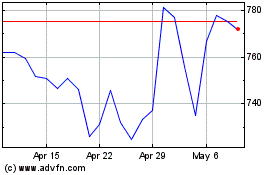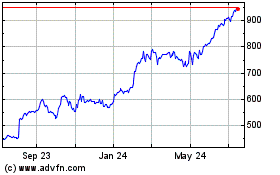By Peter Loftus and Jared S. Hopkins
This article is being republished as part of our daily
reproduction of WSJ.com articles that also appeared in the U.S.
print edition of The Wall Street Journal (May 12, 2020).
Drug-company sales representatives, grounded by the coronavirus
pandemic, are blasting out emails and hosting video calls to pitch
new treatments for a variety of ailments to doctors, a different
way of doing things for a field force that had relied on visiting
with physicians in person.
On Friday, the U.S. Food and Drug Administration approved a new
cancer drug from Eli Lilly & Co. The company plans to make the
drug available within days -- and to spread the word by having
sales reps, working from home, email doctors and set up remote
meetings with slide presentations, and to run ads promoting the new
medicine on websites aimed at health-care professionals.
"We have a responsibility to make sure we inform doctors, given
that cancer is not going to take a break" during the pandemic, said
Eric Dozier, vice president of North American oncology for
Lilly.
The changes could impact company bottom lines, experts say. The
industry has long considered the launch of a drug crucial to its
sales performance.
Yet drugmakers can't now draw on the very tactics long counted
on to give new products a strong start, such as reviewing the new
drug's profile over dinner and dropping off samples at a doctor's
office.
"If a rep can't go there, and a physician doesn't read emails
thoroughly, the physician isn't going to be aware" of the new
product, said Pratap Khedkar, principal with consulting firm ZS
Associates. "The launch suffers a lot. That back-and-forth, the
learning that happens in the first six months, is not going to
happen."
The virtual drug launch is a big shift from the industry's
longtime sales and marketing approach. Before the coronavirus, an
FDA drug approval sent sales reps fanning out across the U.S. to
tout the benefits of a product physicians might not know about
otherwise.
The reps often brought free lunches for doctors, nurses and
office staff to gain precious face time for their pitches. And the
reps dropped off or arranged shipment of free drug samples, which
doctors gave away to patients.
But drugmakers ordered reps to remain at home due to the new
coronavirus. At the same time, hospitals and doctor's offices have
barred visitors to minimize the spread of the virus.
To adapt to the new reality, many drugmakers have canceled the
restaurant dinners in which they pay physician experts to discuss a
new drug's benefits and risks with other doctors, switching to
virtual events. And reps are trying to talk with doctors via
videoconference.
Veeva Systems Inc. has seen a surge in use of the software it
sells to drug companies to facilitate online interactions with
doctors. In April, companies conducted more than 316,900 remote
meetings with doctors and sent about 7 million emails to them
globally, compared with 4,900 remote meetings and 1.2 million
emails in January, according to Veeva.
Drugmakers tried some of these virtual tactics pre-pandemic, but
with limited success. Doctors engaged less with the virtual
interactions than in-person visits, industry officials say.
While nearly half of U.S. doctors allowed in-person visits from
sales reps just before the pandemic, only 10% opened emails from
company reps, according to ZS, which advises drug companies on
sales strategies.
Due to the challenges, some companies have postponed the launch
of new drugs.
Bristol-Myers Squibb Co. is delaying the launch of
multiple-sclerosis treatment Zeposia partly so its sales reps can
meet with doctors face to face because of the amount of education
involved, said Chris Boerner, the company's chief commercial
officer.
Bristol said last week it hopes to launch the drug in June, and
virtual tools will likely be a part of the launch
"You do miss something in non-personal engagement you get from
an in-person conversation, whether it's being able to read the
room, being able to understand what's really on the mind of the
customer," Dr. Boerner said. "There's simply no replacement for
that."
The new Lilly drug, Retevmo, treats lung and thyroid cancers
that have certain genetic traits. After many employees began
working from home in March, the drugmaker prepared messages for
sales reps to email to doctors upon FDA approval. The messages
discuss how the drug helped the subjects of clinical trials.
Yet the company doesn't want to overwhelm doctors with pitches.
"There's just increased pressure on the health care community right
now, so the last thing we want to be is an added burden," Mr.
Dozier said.
Lilly set a list price for Retevmo of about $20,600 per 30 days
of therapy for each patient. The company said patients'
out-of-pocket costs will vary depending on their insurance plans,
and the company will offer assistance to eligible patients to
reduce those costs.
Some doctors say the inability to pitch drugs in-person and
employ tactics like dinners or meals in offices may be a positive
move, given how research has indicated the industry's sales
strategies can improperly affect physician prescribing
practices.
"It's possible that their ability to influence physicians will
diminish because of the much more impersonal nature of virtual
interactions," said Aaron S. Kesselheim, a professor of medicine at
Harvard Medical School.
Esperion Therapeutics Inc., instead of dropping off samples of
new cholesterol drug Nexletol at doctor's offices, is sending them
to patients directly, if a physician requests, Chief Executive Tim
Mayleben said.
Due to limited face time with doctors, Biohaven Pharmaceutical
Holding Co. Ltd. started airing TV ads months earlier than planned
for its newly-approved migraine drug Nurtec, Chief Executive Vlad
Coric said. The company also placed Nurtec information on the
website of a telemedicine company several months earlier than
planned.
--Denise Roland contributed to this article.
Write to Peter Loftus at peter.loftus@wsj.com and Jared S.
Hopkins at jared.hopkins@wsj.com
(END) Dow Jones Newswires
May 12, 2020 02:47 ET (06:47 GMT)
Copyright (c) 2020 Dow Jones & Company, Inc.
Eli Lilly (NYSE:LLY)
Historical Stock Chart
From Mar 2024 to Apr 2024

Eli Lilly (NYSE:LLY)
Historical Stock Chart
From Apr 2023 to Apr 2024
